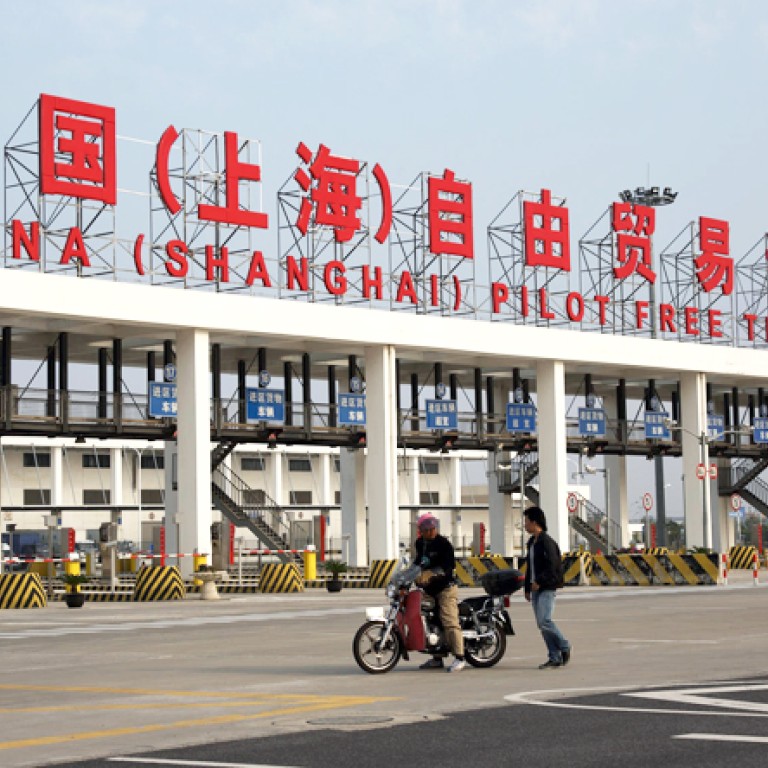
International law could be used in free-trade zones
China is considering the introduction of international law in a big push to get free-trade zones (FTZs) up and running to promote the use of the yuan in global trade, which could challenge Hong Kong, the main offshore centre for the currency, in the long term.
China is considering the introduction of international law in a big push to get free-trade zones (FTZs) up and running to promote the use of the yuan in global trade, which could challenge Hong Kong, the main offshore centre for the currency, in the long term.
Chinese leaders have been discussing for the first time the adoption of an international legal system in the FTZs to help lure foreign companies, although views are varied, sources said.
“Authorities recognise that providing a robust legal framework and infrastructure will attract global companies,” a Hong Kong government official briefed on the FTZ discussions said.
“But agreement on this is far from uniform.”
Bankers said such a move would go a long way to make FTZs more competitive with Hong Kong, which has been the only notable success among the country’s attempts to allow the closely managed yuan to trade more freely.
“The offshore yuan hub in Hong Kong is an experiment,” said Marc Chandler, global head of foreign exchange strategy at Brown Brothers Harriman during a visit to Hong Kong.
A robust legal framework and infrastructure will attract global [firms]
“And the policy mindset is if the experiment is successful, bring it back to the mainland, and if not, abandon it.”
Traditionally, Chinese leaders have promoted Hong Kong as the main offshore market for yuan trading. About 18 per cent of the country’s global trade is now conducted in yuan, from just 1 per cent in 2009, and much of it is routed through the city.
Hong Kong’s success has been underpinned by a strong rule of law and freedoms under the “one country, two systems” formula adopted when Britain handed over its colony to China in 1997.
A closed-door Communist Party plenum from Saturday to Tuesday is expected to set in motion efforts to kick-start several FTZs around China.
Several special economic zones have already been set up, but in many cases rules over how participating companies can operate have been fuzzy, limiting their success.
They include Tianjin, Qianhai in Guangdong, and Xiamen in Fujian province. Shanghai set up an FTZin late September.
Analysts, including Jun Ma at Deutsche Bank, expect the FTZs to be the labouratories in which the government tests the deregulation of interest rates and the opening of China’s capital account, which would mean a more freely traded yuan, also know as the renminbi (RMB).
“At the initial stage, I think China may choose some companies to try innovative business with quotas,” said Ngan Kim-man, head of RMB business strategy and planning at Hang Seng Bank.
The zones are unlikely to match Hong Kong’s business environment soon. They might introduce lower corporate tax rates to try to compete with Hong Kong’s rate of 16.5 per cent.
Indeed, Qianhai, an hour’s drive from Hong Kong, plans to offer a corporate tax rate of just 15 per cent.
But bankers and government officials say allowing international law to govern the FTZs would make a big difference in getting foreign companies to join them.
Citigroup and Singapore-based DBS were among the first banks to open offices in the Shanghai FTZ. Other global banks and companies have said privately they would join as well if China allowed special legal rights in the FTZ similar to those available in centres such as Taipei, Singapore and Dubai.
If China adopts a similar legal framework in these zones, we will see companies and banks making a beeline into these zones ... Otherwise, we are likely to see only a token presence by global companies
“If China adopts a similar legal framework in these zones, we will see companies and banks making a beeline into these zones,” said the head of cross-border trader services at a European bank in Hong Kong, who declined to be identified because he is not authorised to speak openly to the media.
“Otherwise, we are likely to see only a token presence by global companies.”
Still, it would be a big step, so there remains resistance to the idea among policymakers, the Hong Kong official said.
“By allowing international law in these zones, you are basically ceding control in these areas,” the official said.
Although the plenum may provide the policy platform for changes, detailed rules, regulations and laws may take some time to produce.
“By recognising the fact that officials are at least considering various [legal] models suggests their intent in using these zones as the catalyst for the next phase of reforms. Legal reforms fall under the ambit of administrative reforms, which are far more difficult to implement,” the official said.
The potential changes suggest Hong Kong can no longer rely on Beijing to keep promoting the city as the major offshore yuan hub, which local officials seem to recognise.
“We should complement the policies introduced by the central government and play more effectively the first-mover role in the process of developing a diversified financial market in the mainland and expediting the internationalisation of the RMB,” Hong Kong Secretary for Financial Services and the Treasury Chan Ka-Keung said in a written response to a question in the Legislative Council about the city’s role in light of the FTZs on the mainland.

